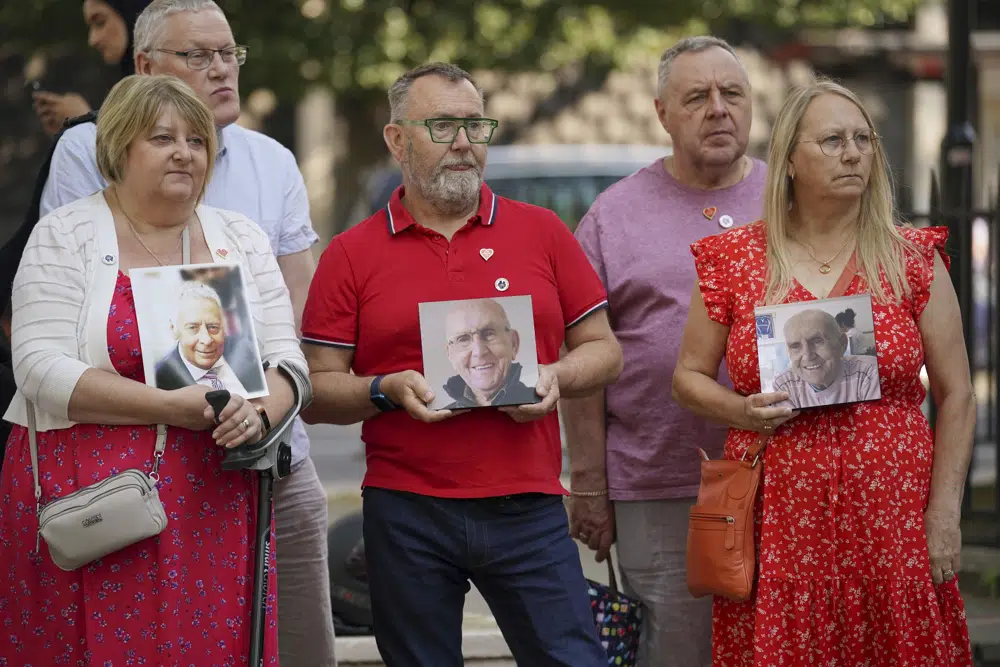UK COVID-19 Inquiry Questions Potential Avoidance or Reduction of Devastating Consequences
London (AP) – The extensive three-year public inquiry into the UK government’s handling of the COVID-19 response commenced on Tuesday, examining whether improved planning could have mitigated the suffering and fatalities. Additionally, the inquiry aims to investigate whether the complexities and prolonged process of exiting the European Union diverted authorities’ attention from adequately preparing for potential threats.
Leading the inquiry as counsel, lawyer Hugo Keith highlighted the unprecedented scale of death and illness brought about by the coronavirus pandemic in modern Britain. With COVID-19 listed as the cause of death for 226,977 individuals in the UK, Keith posed a crucial question: were the catastrophic consequences unavoidable or could they have been prevented or minimized?
Outside the anonymous London office building where the inquiry is being conducted, a group of individuals who lost loved ones to COVID-19 held up pictures, expressing their grief. The first day of public hearings began with a poignant 17-minute video, featuring personal accounts of the pandemic’s devastating impact on individuals and their families.
Retired Judge Heather Hallett, Leading UK COVID-19 Inquiry, Commends Families’ Dignified Vigil
Retired judge Heather Hallett, who is heading the UK COVID-19 inquiry, commended the families for their dignified vigil, acknowledging that the inquiry is being conducted on their behalf and on behalf of the millions who have endured and continue to suffer due to COVID-19.
The UK has witnessed one of the highest pandemic death tolls in Europe, sparking endless debates about the decisions made by former Prime Minister Boris Johnson’s government. Under pressure from bereaved families, Johnson agreed to initiate the inquiry in late 2021.
Scheduled to hold hearings until 2026, the inquiry will delve into the UK’s level of preparedness for a pandemic, the government’s response, and the valuable lessons to be learned for the future.
Senior scientists and officials, including former Prime Minister Boris Johnson, are anticipated to appear as witnesses in the UK COVID-19 inquiry. Retired Judge Heather Hallett, endowed with the authority to summon evidence and question witnesses under oath, is currently engaged in a legal dispute with the government regarding her request to access unedited notebooks, diaries, and WhatsApp messages involving Johnson and other officials.
UK public inquiries are renowned for their thoroughness but tend to be protracted. For instance, the inquiry into the 2003 Iraq war and its consequences began in 2009 and published its extensive 2.6-million-word report in 2016.
Hallett has announced her intention to release findings after each section of the inquiry, rather than waiting until all hearings conclude.
According to Keith, the initial section of the inquiry will focus on whether British planning excessively relied on the incorrect assumption that a future pandemic would resemble influenza.
He highlighted that in March 2020, at the onset of the pandemic, the government had asserted that the United Kingdom was adequately prepared to respond and provide substantial protection to the public. However, Keith expressed that even before examining the evidence, it is apparent that the level of preparedness might have been insufficient.
Furthermore, Keith emphasized that the planning for Britain’s departure from the European Union, which consumed significant governmental attention for years following the 2016 Brexit referendum, diverted resources from the necessary efforts to prepare for potential pandemics.
Keith highlighted the substantial planning and preparation required for Britain’s departure from the European Union, especially in addressing the anticipated severe consequences of a potential no-deal exit on crucial areas such as food and medicine supplies, travel and transport, and business borders.
He emphasized that the extensive planning efforts for Brexit, starting from 2018, overwhelmed and hindered the implementation of essential improvements that the central government recognized as necessary for resilience planning and preparedness. This diversion of resources and attention affected the ability to adequately address and enhance the country’s readiness for potential crises, including pandemics.


